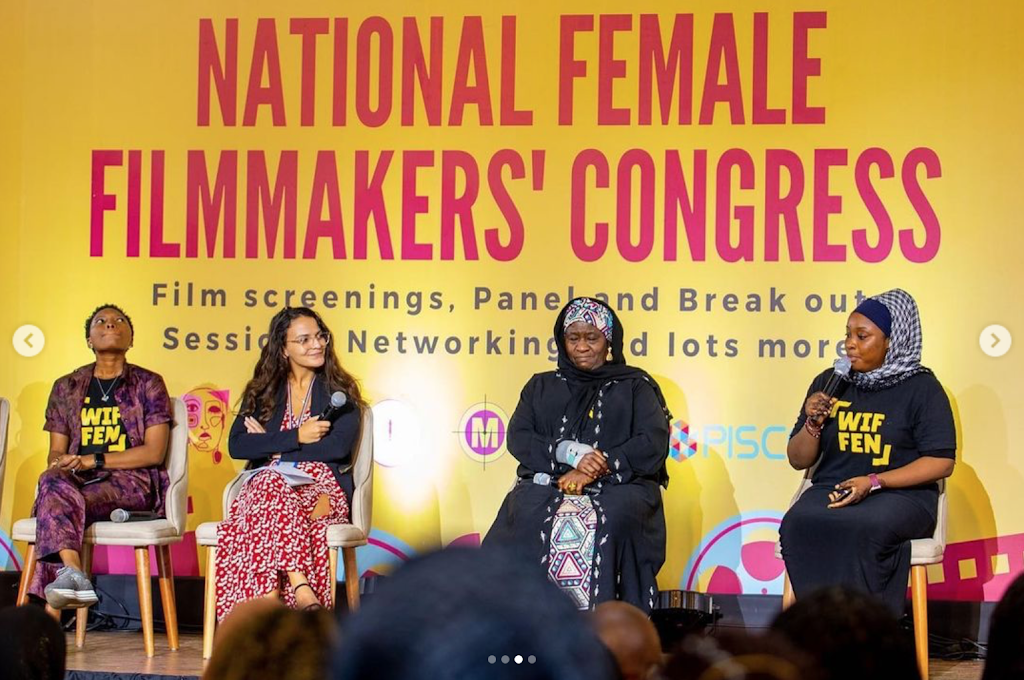A Gathering of Women in Film

Panel session at the National Female Filmmakers’ Congress. “Women belong in all spaces.” We are glad to see that more women have accepted this and are creating rooms for themselves to be seen and heard. While there is still so much work to be done, we are seeing women buck against gender norms in career choices because, and it is sad that this has to be said…careers are not gendered. We are especially ecstatic about the number of women who are taking on roles in all areas of filmmaking: writing, editing, directing, production, marketing, distribution etc. You are as likely today to see a woman rigging her own camera and lights as you are to see one in the biggest rooms where film publicity and distribution are discussed. This is such a flex! It is why when we heard about the conference for women in film, we were excited to attend. The National Female Filmmakers Congress was organized by Girls Voices Initiative, conveners of Women’s International Film Festival Nigeria (WIFFEN), on October 11, 2022 at the Shehu Musa Yar’adua Centre in Abuja. The congress was a gathering of filmmakers to celebrate women in film, the International Day of the Girl Child and World Mental Health Day. It was an avenue to watch films made by women, listen to filmmakers share their experiences in the industry, and generally pick up lessons that we could adopt to improve our work as filmmakers. Cross-section of participants at the event. Welcome remarks were given by Emmanuelle Blatmann, the French Ambassador to Nigeria, and Mrs. Carolyn Seaman, Creative Director, Girls Voices Initiative. Two films were screened at the event: Miss Binary by Girls Nation (Kano) and The Burial of all Women by Girls Nation (Abuja). The films centered on resilience and mental health, and were a powerful watch. Following the film screening was a panel discussion on the films that had been viewed. Panelists included Halima Ben-Umar, Maryam Abubakar, Binwana Gazuwa, Amaka Agudiegwu, Asabe Madaki from Girl Nation in Kano and the Federal Capital Territory, Abuja. They shared their experiences and how the Girl Nation program has impacted their life and work. Panel session with Nadine Ibrahim and Rahama Sadau. Other panel sessions were “Tips on Global Standard Productions (Netflix, Amazon Prime, International Film Festival etc.)” with Nadine Ibrahim of Nalia Media and Rahama Sadau, Actor and Producer at Dee Dee Films where they urged filmmakers to be authentic, detail and quality oriented, and to build a portfolio that proves the quality of their work. There were breakout sessions around funding films, and the legal aspects of filmmaking with Mr. Muhammad S. Bawa and Barr. Ese Igbako Esq. respectively. Overall, we think it was a great event and opportunity to engage with a gathering of women in film.
Allow Us to Re-Introduce Ourselves

Shades of Us Storytelling Initiative for African People (‘Shades of Us’) is a non-profit organization using storytelling to address the socio-economic issues affecting Africa, Africans and people of African descent. This is with a view to facilitating open and honest conversations that lead to introspection, analysis and perspective change towards the greater goal of a redefined continent and people. Shades of Us was founded on April 28, 2014, by Ramatu Ada Ochekliye to address dysfunctional social issues peculiar to Africans living on the continent, or descendants of migrants who may have voluntarily moved to other continents or may have been forced – through human trafficking and slavery – to leave. Goal: To promote a just, equitable and sustainable society for Africans and people of African descent. Objectives: – To use storytelling to promote equitable societies for African people; – To spark conversations on human rights, roles and responsibilities for more equal African societies; – To promote African cultures and increase indigenous, national, regional and continental pride in our heritage; – To promote learning, development and capacity building of young people to push for African development and growth; and – To create safe spaces for survivors of abuse geared at facilitating healing and shared communities for growth. The founding principle of Shades of Us is the belief that all human beings are equal, have the same basic human rights and should be accorded the same respect and opportunities that guarantee their growth and development. Based on this founding principle, Shades of Us is subscribed to all thirty articles of the Universal Declaration of Human Rights and works towards promoting these rights for every human being, with special focus on Africans and people of African descent. Beyond the human rights declaration however, Shades of Us has adopted eleven of the seventeen Sustainable Development Goals (SDGs) as focal points of implementation. These goals include: no poverty; zero hunger; good health and wellbeing; quality education; gender equality; clean water and sanitation; decent work and economic growth; reduced inequalities; climate change; peace, justice and strong institutions; and being open to partnerships for the goals. They translate to Goals 1, 2, 3, 4, 5, 6, 8, 10, 13, 16 and 17 of the sustainable development goals. Shades of Us believes that the promotion of gender equality and reduced inequalities are the springboards to achieving all the other goals adopted. The organization is especially bias towards the issues that affect women and children. This is because globally, African women and children have been the most disenfranchised in all indices of human development. Speaking up for, and standing against societal norms that predominantly affect women and children, becomes the only recourse to redressing years of inequality and the drawbacks associated with it. What does Shades of Us offer? The answer is simple: storytelling. We tell stories for Africa, her people and descendants of her people. These stories are channeled through various platforms to engender discussion. They include: 1. The Blog: Primarily started as a site to air personal opinions, Shades of Us has grown to a magazine of articles, in-depth interviews, news and fictional stories from various writers. 2. Podcasts: Shades of Us has two podcasts: The Review and The Social Commentary. On The Review, the overarching themes in the art (music, movies, TV shows, books etc) produced by Africans and people of African descent are discussed and analysed to see how they shape society. With the Social Commentary, discussions around socio-economic issues affecting people are at the forefront of the conversation. 3. Video log: This is similar to the social commentary with special focus on issues affecting women and children. 4. Films: The organization produces short films that address the general theme of our work. This will expand further to feature length films, documentaries and other productions in the audio-visual category. 5. ‘Did you know?’ Quick-E videos: These showcase facts about indigenous African peoples and cultures are shared as short snippets. It is a fun way to learn about people who share the same skin tone and socio-cultural issues yet, are vastly different from us. The ‘e’ in Quick-E is Education. 6. Forum Fridays: This is a live interactive session where the audience does the talking. It would entail picking up trending topics and hearing their thoughts, feelings, rebuttals and rants. 7. Community Engagement: Beginning in 2016, Shades of Us started partnering with other organizations like Save Our Women (SOW) Foundation, Women Regaining Value, Stand With A Girl (SWAG) Initiative and Jela’s Development Initiative (JDI) to move our activism from the digital space to impacting, in-person actions. This will continue to happen in line with goal 17 of the global goals. And beginning in 2022, Shades of Us will host what would become an annual event called Safe Spaces. This is an avenue to bring together victims of abuse to talk about their abuse, how it affects their lives, how society – families, schools, governing authorities, law enforcement etc. – reacts to their abuse and what hope they have going forward. Another aspect of our community engagement will be through basketball and filmmaking. We will use these avenues to train young people to become the best versions of themselves. For years, our identity and brand has revolved around these areas of engagement. When we started Shades of Us, we designed our logos to be feminine because first, we are a feminist organization, and… they described the core of the work we were focused on. While that remains our core mandate, our next phase will be more inclusive. We have grown from personal commentaries on Facebook to a fully incorporated non-profit organization registered in Nigeria. We intend to branch out to eleven other countries in Africa and the Caribbeans: Ghana, Rwanda, South Africa, Seychelles, Botswana, Mauritius, Madagascar, Kenya, Uganda, Barbados, and Jamaica. We want to tell stories about women, children, men, gender non-conforming individuals, people with disabilities etc. As such, we designed our new logo to be more representative of all the shades of us. So…it is with immense

